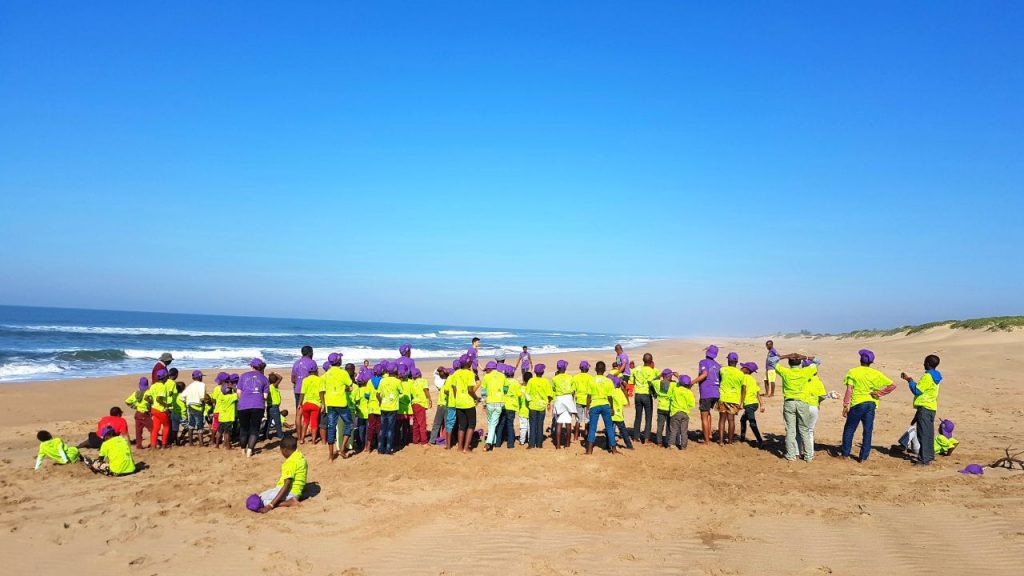
The sprinkler, America’s dancing cheat code. A lifeline to safety when you’ve forgotten why you have hands. Aside from mimicking a common gardening appliance, dancers can look forward to exhibiting minimal coordination while turning from side to side and splitting the Macarena squarely in half. Regardless of the move historically being one corniness-degree away from flat out popping, the sprinkler remains on full display in nightclubs, end zones and most recently Mtunzini, South Africa.
When I was asked to present on my American culture, lots of things came to my mind; apple pie, trucks, Obama, but what ultimately represented America the best (or rather evoked the best reactions) for 55 young South African children who had never visited, was the dancing.
At this point the kids were rolling, and running up and down around the circle, losing their minds at the thought of this foreigner almost killing himself in front of 50-some middle schoolers. I stood up red faced, brushed the dirt from my pants, and took a seat back in the circle as others joined to fill my place and continue on in celebration.
We were all squatting around a large camp fire as Vusi, the camp dance instructor, beat deftly on a skin drum. The children had just finished showing off the Zulu dance, Ingoma, and 110 restless feet tapped along in rhythm. I mistakenly made eye contact with the head counselor, Ayanda, and he motioned for me to come into the circle center. Luckily I was used to this, the kids thought it was quite hilarious for me to try Ingoma on my own, and I began to assume the position, bracing for the embarrassment. For whatever reason, this time, I felt bold, and as I raised my hands above my head (the first step in Ingoma), I instead planted one firmly on the back of my neck, and dangled the other perpendicular to my chest.
What I lacked in skill I made up for in enthusiasm. I wriggled and contorted clockwise while trying to match Vusi’s pace. Laughter fueling my confidence, I flared the dance up a notch, and began to dip back in a sort of limbo motion. Eventually, with adrenaline masking my body’s true elasticity, I stumbled backwards and spun to the ground inches away from falling face down into the embers. At this point the kids were rolling, and running up and down around the circle, losing their minds at the thought of this foreigner almost killing himself in front of 50-some middle schoolers. I stood up red faced, brushed the dirt from my pants, and took a seat back in the circle as others joined to fill my place and continue on in celebration.
The differences in my interactions with the campers after that fiasco were day and night. If I had to equate it to something canine, I’d say I had just gone belly-up. It’s hard to get young children to listen to you, let alone trust you, especially when you can’t speak their first language, and they don’t recognize your skin color. The sprinkler had, accidentally, provided an opportunity for non-verbal vulnerability, in which I hope that I positively conveyed my willingness to participate, and make mistakes alongside everyone else around the fire. The sprinkler certainly didn’t magically bandage a large cultural divide, nor did it equip me the tools needed to better care for these children. But the sprinkler did provide many future moments of laughter, and it became the sole component of 55 new “secret handshakes.” The sprinkler, if anything, served as a mnemonic for my best foot forward. It not only made the kids more spontaneous around me, but elevated the confidence I had to genuinely contribute something meaningful to children with serious life challenges which I couldn’t relate to.
On the final day of camp, the kids presented a play to the staff in which they reminisced on some of the activities they had completed throughout the week. Several of the children broke off to perform Ingoma, and to my excitement, they found a way to infuse this dorky American disco move into their presentation. The shoutout was small, and merited scattered chuckles, but I received the gesture as a confirmation of something positive, and carefree which I had imprinted upon the campers. The sprinkler had become my literal lifeline to these kids, and for once I knew what to do with my hands.
